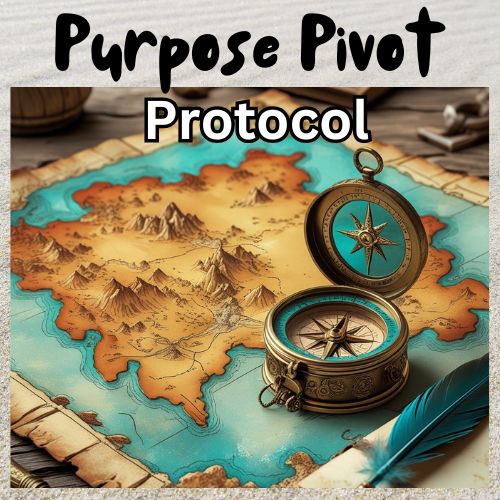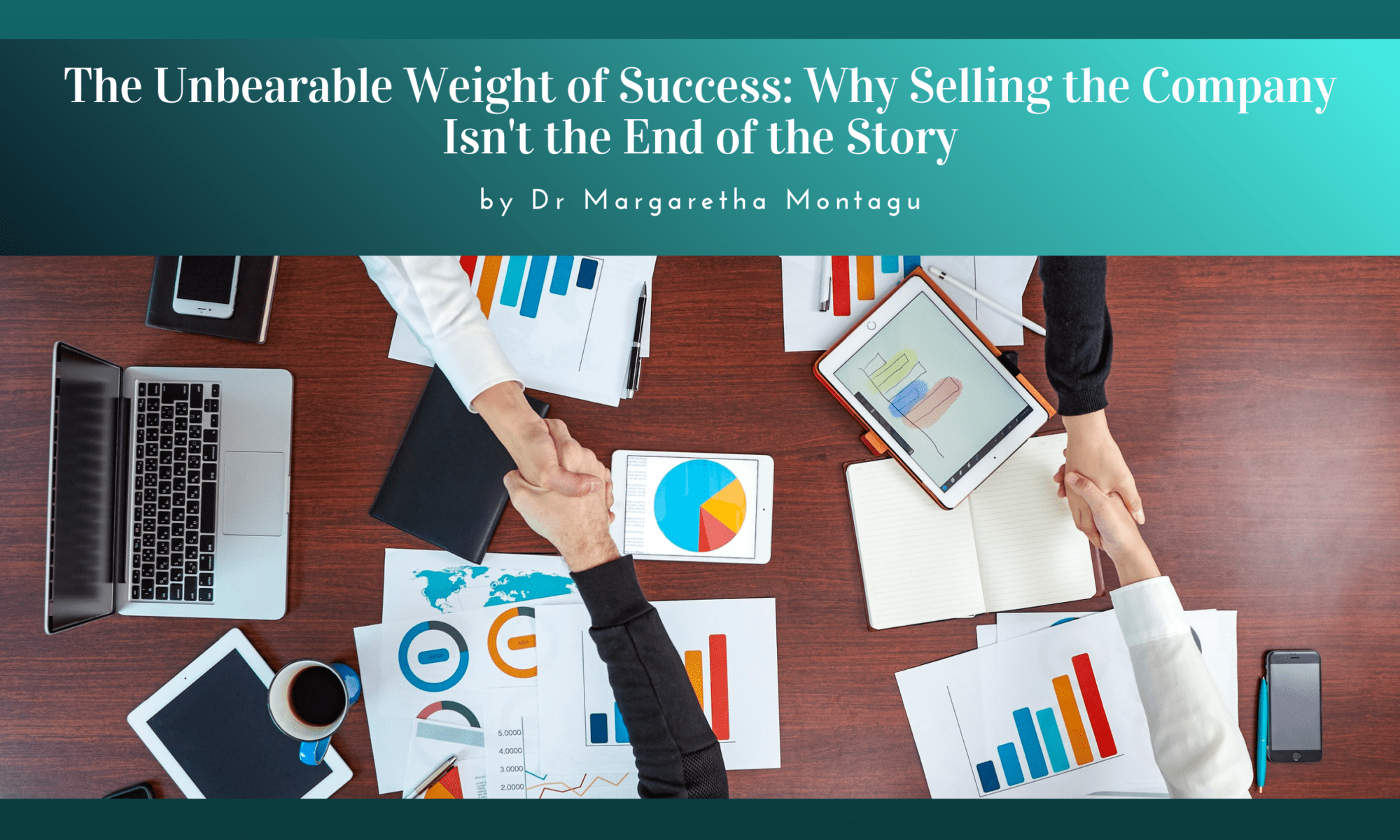The champagne has been uncorked, the congratulations received, and the wire transfer confirmed. You’ve just sold the company you built from nothing – the business that consumed your days, invaded your dreams, and became synonymous with your identity for decades. The financial security you’ve gained is undeniable, yet something unexpected lingers beneath the celebration: a profound sense of emptiness that nobody warned you about.
If you’re experiencing this contradiction – the simultaneous relief and loss, excitement and confusion – you’re not alone. The transition from entrepreneur to “what’s next?” represents one of life’s most complex psychological passages, particularly for those in their 50s, 60s, and beyond who’ve dedicated their prime years to building something meaningful.
The Emotional Archaeology of Success
Selling a business isn’t just a financial transaction; it’s an emotional excavation that unearths layers of identity, purpose, and self-worth accumulated over years of entrepreneurial struggle and triumph. The grief that follows isn’t about the money – it’s about the sudden absence of the daily rhythm that gave your life structure and meaning.
Dr. Sarah Mitchell, who specialises in executive transitions, describes this phenomenon as “purpose displacement.” She explains, “These people have spent decades being needed, making critical decisions, and seeing immediate results from their actions. Suddenly, that framework disappears, leaving them in an unfamiliar landscape without a map.”
The grief is real and multifaceted. There’s mourning for the loss of daily challenges that kept your mind sharp, the absence of a team that looked to you for leadership, and the void left by the constant problem-solving that made you feel vital and necessary. Even the toxic aspects of business ownership – the stress, the sleepless nights, the difficult decisions – become part of what you miss, simply because they were part of who you were.
This isn’t weakness; it’s human nature. When something that significant disappears from your life, regardless of how positive the circumstances, your psyche needs time to adjust to the new reality.
The Identity Maze
Perhaps the most disorienting aspect of post-sale life is the identity confusion that follows. For years, when someone asked “What do you do?” you had a clear, confident answer. You were the founder, the CEO, the person who built something from nothing. That identity extended far beyond work hours – it influenced how you saw yourself, how others perceived you, and how you moved through the world.
Now, stripped of that familiar role, many successful entrepreneurs find themselves asking fundamental questions they haven’t confronted in decades: Who am I when I’m not solving problems? What do I want when I’m not driven by necessity? How do I introduce myself at social gatherings? The questions seem simple, but strike at the core of self-perception.
This identity vacuum often manifests in unexpected ways. Some people throw themselves into new ventures immediately, not because they’re passionate about them, but because they need the familiar framework of business challenges. Others become restless travellers, hoping that constant movement will fill the internal void. Still others retreat into isolation, unsure how to engage with a world that no longer requires their particular skills and experience.
The confusion is compounded by well-meaning friends and family who assume you must be thrilled with your new freedom. “You can do anything now!” they say, not understanding that the abundance of choice can be paralysing when you’ve spent decades operating within the clear constraints of business necessity.
The Freedom Paradox
Freedom, it turns out, can be its own burden. After years of operating within the structured demands of running a company, the sudden absence of external pressures can feel more disorienting than liberating. Without deadlines, meetings, and the constant stream of decisions that once filled your days, time becomes fluid and, paradoxically, harder to manage meaningfully.
This newfound freedom often reveals how much of your previous happiness was tied to external validation – the satisfaction of closing deals, the respect of employees, the tangible proof of your value in the marketplace. Without these regular affirmations, many successful entrepreneurs discover they’ve lost touch with internal sources of satisfaction and purpose.
The excitement that accompanies this freedom is real too, though it often comes in waves rather than as a steady state. There are moments of pure possibility – perhaps while watching a sunset you never had time to notice before, or during a midweek conversation with a grandchild who’s no longer competing with urgent phone calls for your attention. These glimpses of what life could be provide hope and direction, even as they highlight how much you’ve sacrificed along the way to success.
The Structured Path Forward: Emotional Reintegration
Navigating this transition successfully requires more than time – it demands a structured approach to emotional reintegration and purpose rediscovery. The challenge isn’t just finding something new to do; it’s rebuilding your sense of self around intrinsic rather than external motivations.
The first phase involves acknowledging and processing the grief. This means creating space for the conflicting emotions without judgment, understanding that missing your old life doesn’t diminish your gratitude for your current opportunities. Many people try to skip this step, viewing it as ungrateful or weak, but attempting to bypass the emotional processing only delays the eventual reckoning.
Emotional reintegration also requires examining the values and motivations that drove your entrepreneurial success. What aspects of business ownership truly fulfilled you? Was it the problem-solving, the leadership, the creative challenge, or the impact on others? Understanding these core drivers helps identify how to channel them in new directions that don’t require the 80-hour weeks and constant stress of running a company.
This process benefits enormously from structured guidance. The transition from entrepreneur to “what’s next?” follows predictable patterns, and having a framework for navigation prevents the common pitfalls of either rushing into unsatisfying new ventures or drifting aimlessly through unstructured time.
Rediscovering Purpose in Your Second Act
The concept of a “second act” has become increasingly relevant as life expectancy extends and people find themselves with decades of productive years remaining after traditional career peaks. However, discovering what that second act should look like requires intentional exploration and often a fundamental shift in how you define success and fulfilment.
Unlike your first career, which was often driven by external necessities – making money, building security, proving yourself – your second act has the luxury of being guided primarily by internal motivations. This shift from external to internal drivers requires developing a different set of navigation skills, ones that many successful entrepreneurs have never had to cultivate.
The Purpose Pivot Protocol addresses this transition systematically, recognising that finding meaningful direction after major success requires structured exploration rather than hoping inspiration will strike randomly. The protocol begins with a comprehensive self-assessment that goes beyond professional achievements to examine core values, unexplored interests, and the aspects of your previous work that provided genuine satisfaction.
This exploration phase often reveals surprising insights. Many entrepreneurs discover that what they loved most about their business wasn’t the financial returns but the mentoring relationships with younger employees, the creative problem-solving, or the ability to make a positive impact in their community. These insights become the foundation for designing a second act that captures the essence of what made work fulfilling, without the aspects that made it overwhelming.

The Purpose Pivot Protocol – drawing inspiration from the Camino de Santiago, this transformative course guides you through a proven framework to recalibrate your authentic purpose and create a meaningful and fulfilling next act. Get immediate access
The Power of Reflection and Renewal
One of the most valuable aspects of the post-sale transition is the opportunity for deep reflection – something that’s nearly impossible during the intensity of building and running a business. This reflection period, while initially uncomfortable, allows for honest assessment of not just professional accomplishments but personal growth, relationships, and the kind of legacy you want to create.
Many people in this transition discover they’ve been operating on autopilot for years, achieving goals without questioning whether those goals still align with their evolving values and priorities. The forced pause that comes with selling a business creates space for this questioning, even though the answers aren’t immediately apparent.
This reflection process is enhanced by stepping away from familiar environments and routines. The change of scenery – whether through travel, new activities, or simply spending time in natural settings – helps break mental patterns and creates space for fresh perspectives to emerge. Nature, in particular, offers a unique form of renewal that busy entrepreneurs often haven’t experienced in years.
The Healing Power of Nature and Movement
There’s growing recognition that nature immersion provides unique benefits for people navigating major life transitions. The combination of physical movement, natural environments, and time away from familiar surroundings creates conditions that facilitate both emotional processing and creative thinking about future directions.
Walking, particularly in natural settings, has been shown to reduce stress hormones, improve cognitive function, and enhance creative problem-solving – all valuable for someone working through complex questions about purpose and direction. The rhythm of walking also provides a meditative quality that allows thoughts and emotions to surface and be processed at a natural pace.
For many entrepreneurs, the idea of slowing down enough for contemplative walking initially feels foreign or even wasteful. However, this resistance often indicates how much the practice is needed. The ability to be present in the moment, to notice details in the environment, and to experience satisfaction from simple movement represents a crucial rebalancing after years of constant stimulation and achievement focus.
The Camino de Santiago and similar walking experiences offer structured opportunities for this kind of reflection, combining physical challenge with spiritual contemplation in an environment specifically designed to support personal transformation. These experiences provide both the solitude necessary for deep thinking and the community of others navigating their own transitions.










If your soul is craving fresh air, meaningful movement, and a chance to reconnect with nature, join us on a Camino de Santiago Crossroads Retreat in the southwest of France. This isn’t just a scenic hike – it’s a powerful, natural reboot for your body, mind, and spirit. Imagine quiet paths, rolling hills, cozy evenings, and slow conversations. No fitness requirements. No forced bonding. No pressure to have a breakthrough. Just one foot in front of the other, and a journey that meets you exactly where you are.
Building Your Support System
The transition from business owner to whatever comes next shouldn’t be navigated alone. The isolation that many successful entrepreneurs experience during this period often stems from the assumption that they should be able to figure everything out independently – the same self-reliance that served them well in business.
However, this transition involves emotional and psychological territory that’s different from business challenges. It benefits from structured support that combines practical frameworks with emotional understanding. This might include working with transition specialists who understand the unique challenges of post-entrepreneurial life, joining peer groups of others navigating similar passages, or engaging in programs specifically designed for this demographic.
The Purpose Pivot Protocol provides this kind of structured support, offering both individual reflection tools and community connection with others working through similar questions. The program recognises that finding direction after major success requires both internal work and external perspective, both individual contemplation and shared experience.

The Purpose Pivot Protocol – drawing inspiration from the Camino de Santiago, this transformative course guides you through a proven framework to recalibrate your authentic purpose and create a meaningful and fulfilling next act. Get immediate access
Looking Forward: The Adventure Ahead
While the period immediately following a business sale can feel disorienting and emotionally complex, it also represents an unprecedented opportunity for authentic self-expression and meaningful contribution. The financial security you’ve created provides freedom to pursue purposes that might not generate income but could generate profound satisfaction.
Many people in this transition eventually describe it as one of the most rewarding periods of their lives – not because it was easy, but because it led to discoveries about themselves and possibilities they couldn’t have imagined while buried in the demands of running a company. The key is approaching the transition with the same intentionality and strategic thinking that made you successful in business, while remaining open to definitions of success that extend far beyond financial metrics.
Your second act has the potential to be as fulfilling as your first, perhaps more so because it can be designed around your authentic interests and values rather than external necessities. The challenge is navigating the emotional complexity of the transition period with grace and patience, understanding that the discomfort you’re experiencing isn’t a sign that something’s wrong – it’s evidence that something significant is beginning.
The invisible weight of success – the unexpected emotional burden that accompanies major achievement – is real and deserves acknowledgment. But it’s also temporary and ultimately transformative when approached with the right support and framework. Your story isn’t ending with the sale of your company; it’s simply transitioning to a new chapter that has the potential to be your most meaningful yet.
The journey from successful entrepreneur to fulfilled individual living their second act isn’t just about finding something new to do with your time. It’s about rediscovering who you are when stripped of familiar roles and external validation, then rebuilding your life around that authentic core. It’s challenging work, but for those willing to engage with the process, it offers rewards that no business success can match.
Stress destroys Lives. To find out what you can do to safeguard your sanity by taking my insight-giving quiz, subscribe to my mailing list.

Ready to start again, stronger than ever before? This quiz will help you find out. It is not just about measuring where you are right now; it’s about shining a light on the areas of your life that feel meaningful, as well as those that might need attention. It’s an opportunity to reflect, recalibrate, and take steps toward a life that’s not only successful but profoundly fulfilling. Take The Quiz

“I am an experienced medical doctor – MBChB, MRCGP, NLP master pract cert, Transformational Life Coach (dip.) Life Story Coach (cert.) Stress Counselling (cert.) Med Hypnotherapy (dip.) and EAGALA (cert.) I may have an impressive number of letters after my name, and more than three decades of professional experience, but what qualifies me to excel at what I do is my intuitive understanding of my clients’ difficulties and my extensive personal experience of managing major life changes using strategies I developed over many years.” Dr M Montagu

